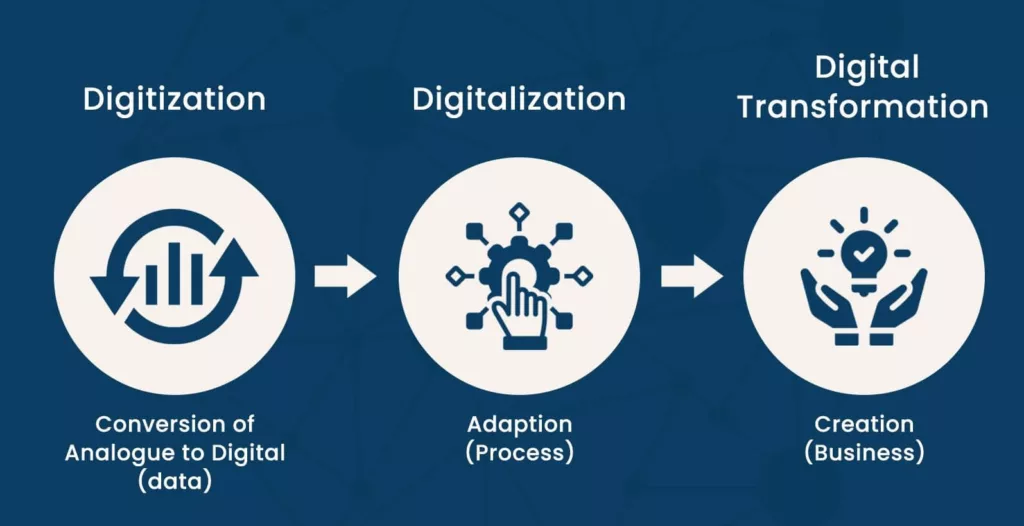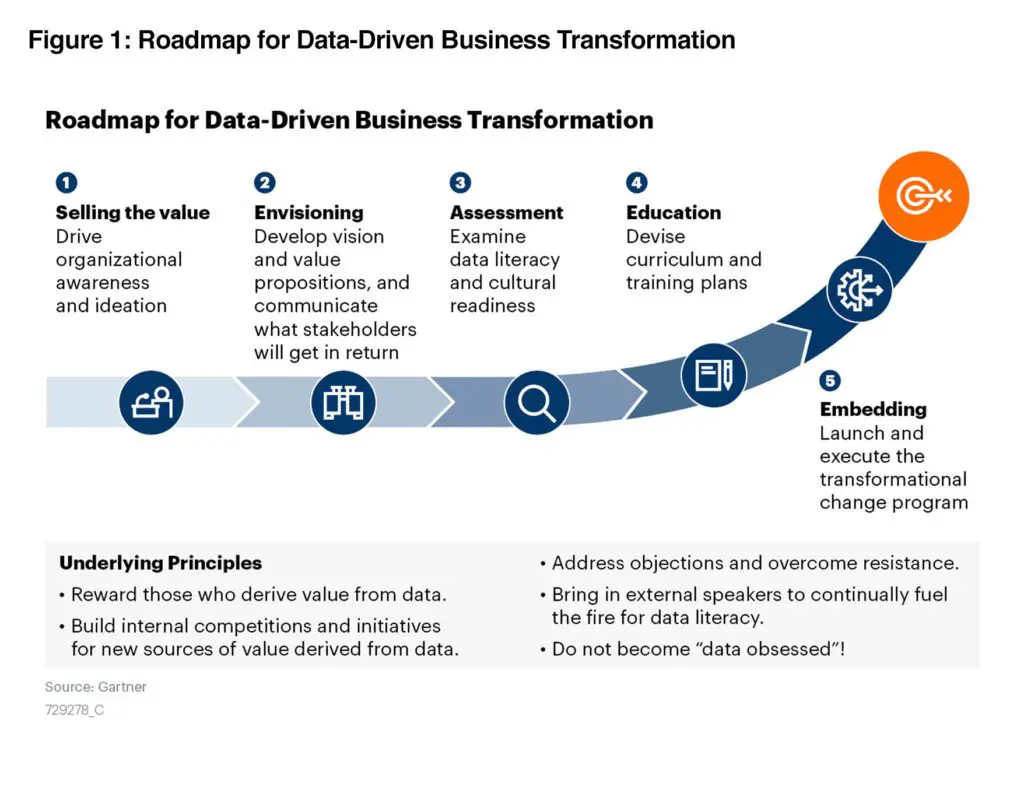In an era defined by rapid technological advancements, businesses are compelled to evolve. Digital transformation, a buzzword that echoes across industries, signifies this profound evolution. But what exactly is digital transformation, and why is it crucial for businesses in today’s digital landscape?
What is Digital Transformation?
At its core, digital transformation is the strategic adoption of digital technologies to revolutionize existing processes, enhance customer experiences, and drive business growth. It’s not merely about integrating technology; it’s a holistic reimagining of how businesses operate and interact with their stakeholders.
Each organization has its own path to digital transformation and there is no one-size-fits-all solution. For instance, a company might use AI or cloud computing to enhance its customer experience. Or it might redesign its supply chain to leverage machine learning. A company can even predict the products customers will want in the future and adjust production accordingly.
However, initiating a digital transformation journey requires a new mindset. It is an opportunity to rethink how companies operate, often from scratch.
Two concepts related to digital transformation are digitization and digitalization.

- Digitization is the conversion of analog information and data into digital form—for example, scanning a photo or document and storing it on a computer.
- Digitalization is the application of digital technologies to change business processes and projects—such as training employees to use new software platforms designed to accelerate product launches. While digital transformation might involve digitalization efforts, it impacts the whole organization.
For most companies, digital transformation requires a shift from traditional thinking to a more collaborative, experimental approach. These new ways of working reveal new solutions which, in turn, can improve customer experience, foster employee innovation and stimulate company growth at the core level.
The Benefits of Digital Transformation

1. Enhanced Efficiency and Productivity
Digital tools automate mundane tasks, enabling employees to focus on high-value activities. Streamlined processes lead to increased efficiency and productivity across the organization.
2. Improved Customer Experience
Digital transformation empowers businesses to understand customer needs better. Personalized interactions, intuitive interfaces, and responsive services enhance customer satisfaction, fostering loyalty and positive brand perception.
3. Data-Driven Decision Making
Digital transformation provides access to vast amounts of data. Analyzing this data yields actionable insights, enabling informed decision-making. Businesses can anticipate trends and customer preferences, making strategic choices that drive success.
4. Agility and Innovation
Adopting digital technologies fosters an agile environment. Businesses can swiftly respond to market changes, experiment with new ideas, and innovate products and services, staying ahead of the competition.
5. Cost Optimization
Automation and efficiency lead to reduced operational costs. Cloud computing and digital tools eliminate the need for extensive physical infrastructure, resulting in significant savings.
6. Enhanced Security Measures
Digital transformation includes robust cybersecurity measures. Businesses can safeguard their data, customer information, and intellectual property, building trust and credibility.
7. Eco-Friendly Practices
By embracing paperless operations and energy-efficient technologies, digital transformation supports environmentally sustainable practices, contributing to corporate social responsibility efforts.
Here are some examples of digital transformation in action:
- Online shopping: Online shopping is a classic example of digital transformation. It has revolutionized the retail industry, making it easier for customers to shop and for businesses to sell their products.
- Mobile banking: Mobile banking is another example of digital transformation. It has made it possible for customers to access their bank accounts and perform banking transactions from their mobile devices.
- Cloud computing: Cloud computing is a type of digital transformation that allows businesses to access computing resources and software over the internet. This can help businesses to save money and to be more agile and scalable.
- Artificial intelligence: Artificial intelligence (AI) is a type of digital transformation that allows businesses to automate tasks and make decisions using data. AI is being used in a wide range of industries, including healthcare, finance, and manufacturing.
Digital transformation is essential for businesses of all sizes. By embracing digital technologies, businesses can improve their customer experience, increase their efficiency and productivity, reduce their costs, develop new products and services, and gain a competitive advantage.
What capabilities are needed to move the needle on digital transformation?
Successful digital transformation requires a variety of coordinated actions. Rewired lays out six capabilities critical for successful digital transformation:
- A clear strategy that focuses on business value. Companies should identify the domains (customer journeys, processes, or functions) that can create the most value for the business and transform them first. The strategy should include a road map, which specifies the solutions and resources required to implement change in the selected domains.
- A strong talent bench with in-house engineers. To succeed in the digital era, you need a solid team of engineers who can develop and deliver innovative solutions. You cannot rely on external partners to achieve digital excellence. You need to have your own digital talent working closely with your business colleagues. The best digital talent programs are not just about hiring: they should also include attractive and rewarding employee value propositions; agile and digital HR processes to recruit, manage, and train talent; and a positive environment where talent can flourish.
- An operating model that can scale. To succeed in digital transformation, companies need to organize themselves in new ways. They need to create cross-functional teams that can collaborate across the organization. There are three main ways to do this: the digital factory, the product and platform model, and the enterprise-wide agility model. Each one has its own advantages and challenges.
- Distributed technology that allows teams to innovate independently.This means that each team can access the data, applications, and software development tools they need without depending on other teams or central IT. APIs, developer tooling, cloud migration, and infrastructure automation are some of the technologies that can help achieve this. By using these technologies, teams can build and deploy digital innovations faster and more reliably.
- Access to data that teams can use as needed. To achieve digital transformation, teams need data that are reliable and current. Data architecture should provide data products that are coherent and easy to use by different teams and applications. Data products are the core element that organize various data pieces into a meaningful unit. Data architecture should also be regularly evaluated and updated. This requires strong governance to ensure data quality and accessibility.
No digital transformation can be successful without coordinated action across all these areas.
How do you know if a digital transformation is working?
It can be surprisingly difficult to know how a digital transformation is going. Without properly tracking and measuring outcomes, leaders will struggle to manage performance and ensure that the changes happening are creating value.
Knowing what to measure is half the battle. In digital transformations, key performance indicators (KPIs) usually fall into three categories:
- Value creation. Digital solutions aim to improve one or more operational KPIs that can have financial benefits.
- Team health. Many digital transformations are delayed because they lack resources, modern methods, or essential skills. We have seen that high-performing teams can be five times more productive than low-performing teams.
- Change-management progress. These metrics show how well the new capabilities and the transformation are developing. Are we setting up teams as planned? Are people motivated? Are we building skills and talent? Are people using the new technology, tools, and products smoothly? We have learned that good is better than perfect when managing change.
How CMC Global can help you with digital transformation
CMC Global offers end-to-end IT and digital solutions, including software development, digital transformation, and IT consulting. With a focus on innovation, quality, and customer satisfaction, CMC Global delivers customized and scalable services to help businesses achieve their digital goals. Our expertise, experience, and commitment to delivering results make us a trusted partner for organizations worldwide.
Learn more about our service
We have more than 30 years of experience in ICT and over 2500 certified professionals who have helped hundreds of businesses to successfully transform their businesses. We have a proven track record of success, and we are committed to helping you achieve your digital transformation goals.
Conclusion
Digital transformation is not a one-time event but an ongoing journey. Businesses that embark on this transformational path embrace innovation, adaptability, and customer-centricity. In a rapidly evolving digital landscape, digital transformation isn’t just a choice; it’s a necessity for businesses striving for long-term relevance and success. Join the digital revolution and unlock a future where possibilities are limitless.
Ready to embark on your digital transformation journey? Contact CMC Global, your trusted partner in navigating the digital landscape and transforming your business for a future of limitless opportunities. Get in touch today!





